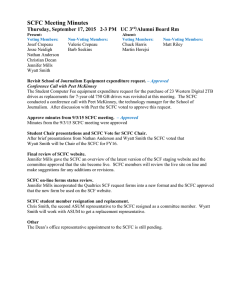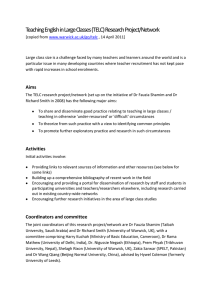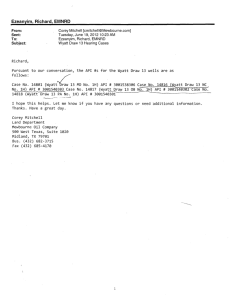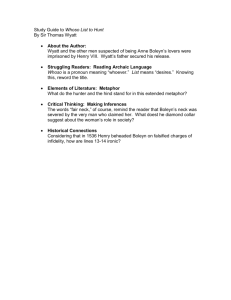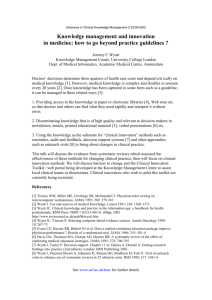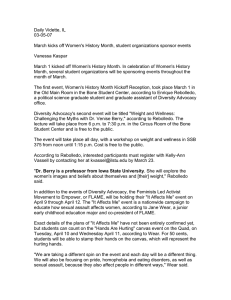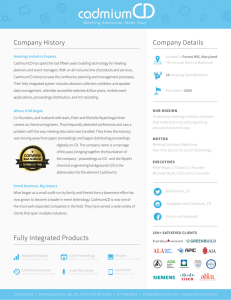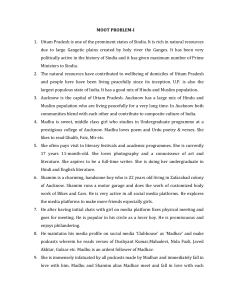Smith, R., P. Rebolledo, F. Shamim and M. Wyatt. 2015. ... IATEFL 2014 Harrogate Conference Selections
advertisement
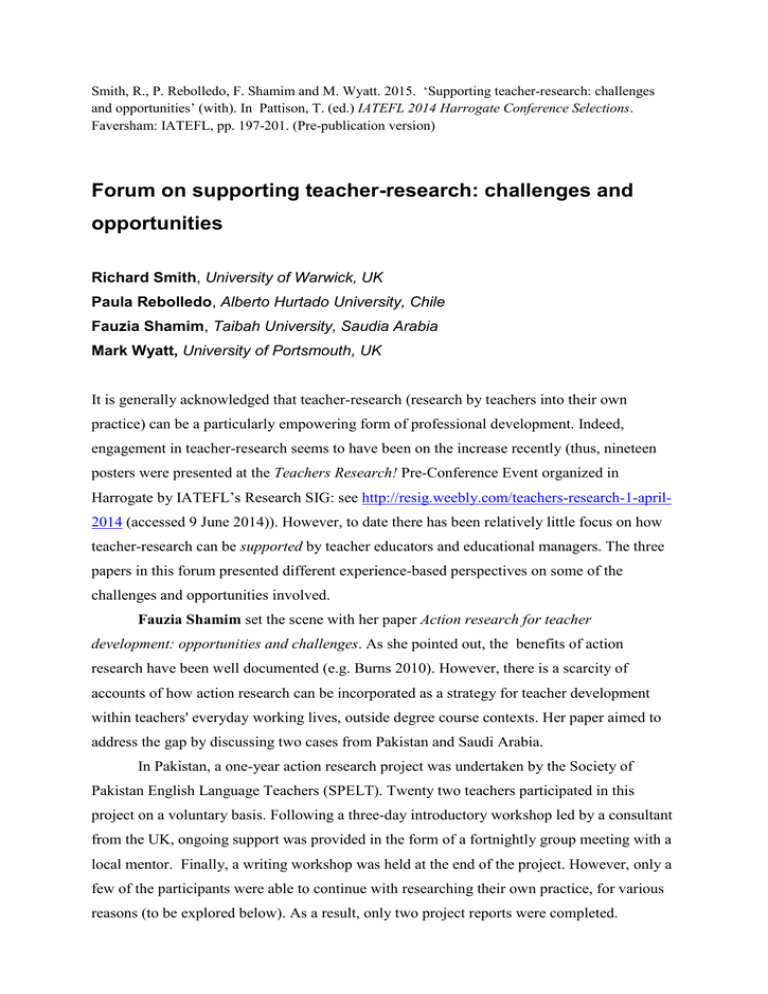
Smith, R., P. Rebolledo, F. Shamim and M. Wyatt. 2015. ‘Supporting teacher-research: challenges and opportunities’ (with). In Pattison, T. (ed.) IATEFL 2014 Harrogate Conference Selections. Faversham: IATEFL, pp. 197-201. (Pre-publication version) Forum on supporting teacher-research: challenges and opportunities Richard Smith, University of Warwick, UK Paula Rebolledo, Alberto Hurtado University, Chile Fauzia Shamim, Taibah University, Saudia Arabia Mark Wyatt, University of Portsmouth, UK It is generally acknowledged that teacher-research (research by teachers into their own practice) can be a particularly empowering form of professional development. Indeed, engagement in teacher-research seems to have been on the increase recently (thus, nineteen posters were presented at the Teachers Research! Pre-Conference Event organized in Harrogate by IATEFL’s Research SIG: see http://resig.weebly.com/teachers-research-1-april2014 (accessed 9 June 2014)). However, to date there has been relatively little focus on how teacher-research can be supported by teacher educators and educational managers. The three papers in this forum presented different experience-based perspectives on some of the challenges and opportunities involved. Fauzia Shamim set the scene with her paper Action research for teacher development: opportunities and challenges. As she pointed out, the benefits of action research have been well documented (e.g. Burns 2010). However, there is a scarcity of accounts of how action research can be incorporated as a strategy for teacher development within teachers' everyday working lives, outside degree course contexts. Her paper aimed to address the gap by discussing two cases from Pakistan and Saudi Arabia. In Pakistan, a one-year action research project was undertaken by the Society of Pakistan English Language Teachers (SPELT). Twenty two teachers participated in this project on a voluntary basis. Following a three-day introductory workshop led by a consultant from the UK, ongoing support was provided in the form of a fortnightly group meeting with a local mentor. Finally, a writing workshop was held at the end of the project. However, only a few of the participants were able to continue with researching their own practice, for various reasons (to be explored below). As a result, only two project reports were completed. In the second case, a one-year action research project was initiated by the author in a university English Language Centre in Saudi Arabia. This had the Centre Director’s support, although it did not form part of the institutional plan for teachers’ professional development. Participation in the project was again voluntary, and 30 out of 63 female teachers signed up for the project after an introductory session. A follow-up workshop and regular fortnightly meetings were held for these teachers throughout the period of the project, and the mentor was additionally available at other times for individual consultations and lesson observation, if required. Quite a few teachers, ranging in number from 6 to 25, attended the group meetings and shared their success stories and challenges. However, by the end only two teachers had been able to complete action research projects in a systematic way. In both of these cases, the participants identified various benefits of action research for their own learning, including teacher empowerment and an enhanced focus on student learning in the classroom. However, it became clear that a more compelling incentive was needed if they were to engage in full-scale action research. The major challenges in both cases included lack of institutional support, competing priorities, time constraints, and lack of familiarity with methods for systematic data collection and analysis. Mark Wyatt’s paper was titled Helping teachers become action researchers through (despite?) teacher education. While teacher education courses often tend to encourage reflective practice and introduce teachers to action research, academics sometimes complain that teachers’ instrumental motivation hampers their development in these areas. Much might depend, though, on the nature of the course. A constructivist programme might be relatively effective in bringing about action research engagement. A teacher education programme in Oman was described. While some of its features might have encouraged instrumental motivation, others seemed conducive to the development of intrinsic motivation. Indeed, qualitative research (e.g. Wyatt, 2011) has provided evidence that some teachers were highly intrinsically-motivated and conscious of the practical benefits of engaging in action research. These benefits included a growing capacity to support and to research learning. The talk highlighted, then, how transformative growth can occur in intrinsicallymotivated teachers if teacher education is situated in local contexts, incorporates mentoring, and promotes reflection and action research. Explanations were provided as to how these elements interacted in a positive way in this particular programme. For example, reflective practice was encouraged through experiential teacher education sessions that incorporated loop input as well as by opportunities being provided for regular teaching in the local context while studying and being mentored. The capacity to engage in action research was supported in ways that built on the encouragement to reflect. For example, there were practically-oriented assignments that developed skills in observing, hypothesizing, planning, adapting materials, monitoring and evaluating. In addition, there was a cooperative sharing of ongoing research experiences as well as formal input. Supervision aimed to be sensitive, tailored to needs, and facilitative of autonomy. Furthermore, the programme was administered in such a way that teachers were given additional time for their research, while the university timetabled research-related tasks (i.e. research proposal, oral presentation and written thesis) so that these were manageable. The outcomes were generally positive. It has been noted, for example by Wyatt (ibid.), that participating teachers grew in autonomy and self-confidence through the course. Some have subsequently spoken at local, regional and international conferences and pursued further studies overseas. Meanwhile, the Ministry of Education in Oman has continued to develop a research culture. Omani regional teacher trainers still run short courses, helping teachers to carry out classroom research which deepens their understandings of the needs of their learners. Finally, in Managing teacher-research -- A project with Chilean secondary school teachers, Richard Smith and Paula Rebolledo shared lessons learned from an innovative project, co-sponsored by the British Council Chile and the Chilean Ministry of Education, which placed teacher-research at centre stage within an in-service CPD intervention (see also Smith et al. 2014). The project was innovative in several respects: participation was voluntary and not qualification-oriented; it targeted secondary school teachers facing large classes, very busy schedules, and other difficult circumstances; it was a relatively ambitious project (potentially involving support for a cohort of eighty teachers from all over Chile for a period of one year via online mentoring); also, the project facilitators adopted a process-oriented approach to developing the project which allowed for ongoing evaluation and a flexible design. Another innovative aspect that emerged early on was the development and promotion of the concept of ‘Exploratory Action Research’. Action Research was favoured for the potentially empowering and bottom-up nature of the professional development it could offer. However, a deliberate attempt was made not to present it as something academic, overpowering or unrealistic for participants. Instead, teachers were encouraged to explore issues before plunging into action and evaluating action, hence, ‘Exploratory.Action Research’. Ways of gathering data were suggested which would be integrated into and useful within ‘normal’ teaching. For example, if students’ lack of motivation is the major problem, the teacher can begin by gathering written or oral feedback from the class in response to prompts like ‘What activites do you find motivating? / would you find motivating?’ On this basis a new action can be planned. However, as was experienced by several participants, the students might actually become more motivated just because the issue has been explored with them: The possibility was allowed for, then, that some teachers might not wish to carry out and evaluate a new intervention at all but instead explore further. About half of the eighty teachers present at the initial taster session made contact with mentors afterwards and embarked on a project. Almost all of them then remained in contact and came together to present on their research by means of posters a year later (in January 2014). An extension of the project into a further period of activity is planned which will engage successful teachers from the 2013 project in mentoring new participants from their region. Aside from providing some practical pointers for others interested in supporting teacher-research, the forum raised important general issues and indicated directions for further research and development. An area of particular debate seems to be whether teachers require external incentives to engage in practitioner research, and if so what incentives might be most effective. Gaining a qualification, of course, is one incentive which underlies many existing reports of teacher-research. Experiences recorded for a qualification have their own positive value (Wyatt), but, as Shamim stressed, there do seem to be relatively few published reports from teachers who have engaged in teacher-research voluntarily, and even the bestintentioned in-service interventions can come up against major barriers when a qualification or other incentive is not offered. Discussion following the papers produced the following list of possible motivators for voluntary teacher-research: institutional recognition in the form of time off; action research constituting one option within approved pathways for professional development; and the possibility being offered of presenting at a conference or publishing a written account (though, as Shamim argued, this may not be motivating to all teachers). At the same time, the way action research is presented to teachers may be a major factor contributing to its uptake or otherwise. If a ‘constructivist’ approach (Wyatt) is adopted, one which takes account of the difficult circumstances teachers often face and which offers a way of addressing those circumstances rather than adding to their burdens (Smith and Rebolledo), then the chances of success may be increased. The form of final reporting can also be made relatively teacher-friendly – thus, what Smith and Rebolledo stressed was allowing for different genres, including posters, or podcasts, and not being colonized by academic norms. As all three of the Forum papers showed in different ways, there are difficulties which prevent many teachers from engaging in self-directed inquiry, including time constraints and the view that research is for academics, not ‘for them’. However, the potential of teacherresearch to empower teachers and to enhance their relationship with learners also emerged strongly, and useful experience-based insights were shared. Finally, a new direction for further research and development seemed to emerge – that is, what can be done to foster sustainability after the end of degree programmes (such as that described by Wyatt) or ‘voluntary’ initiatives (as described by Shamim, and by Smith and Rebolledo)? Email: r.c.smith@warwick.ac.uk prebolledoc@gmail.com fauzia.shamim@yahoo.com mark.wyatt@port.ac.uk References Burns, A. 2010. Doing Action Research in English Language Teaching: A Guide for Practitioners. New York: Routledge. Smith, R., T. Connelly and P. Rebolledo. 2014. ‘Teacher-research as CPD: A project with Chilean secondary school teachers’. In Hayes, D. (ed.) Innovations in Continuing Professional Development for ELT. London: The British Council. Wyatt, M. 2011. ‘Teachers researching their own practice’. ELT Journal 65/4: 417-425.
